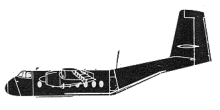Incident Overview

Description
The aircraft had just taken off on an experimental flight when it entered a gradually steepening climb. During the climb the aircraft rolled slowly to the right and, at approximately 200 feet above ground level (agl), it entered a steep nose-down, right-wing-low attitude and crashed. Upon impact, the on-board fuel ignited and the majority of the aircraft wreckage was destroyed by fire. The three crew members aboard the aircraft were fatally injured. The Caribou was the initial aircraft of a modification project by NewCal Aviation that involved the removal of the original Pratt & Whitney R-2000-7M2 piston engines and the installation of Pratt & Whitney PT6A-67R turbo-prop engines and associated equipment. The first flight tests of the modified aircraft began on 16 November 1991. The occurrence flight was intended to be the first of several trips designed to flight-check the fuel and hydraulic systems. Causes: The gust lock system was not fully disengaged prior to flight and one or more of the gust locking pins became re-engaged for undetermined reasons after lift-off. It is unlikely that a control check had been completed prior to take-off and, once airborne, the crew were unable to disengage the gust lock mechanism before losing control of the aircraft.
Primary Cause
Gust lock system malfunction preventing full disengagement, leading to re-engagement of gust locking pins and loss of control.Gust lock system malfunction preventing full disengagement, leading to re-engagement of gust locking pins and loss of control.Share on:





